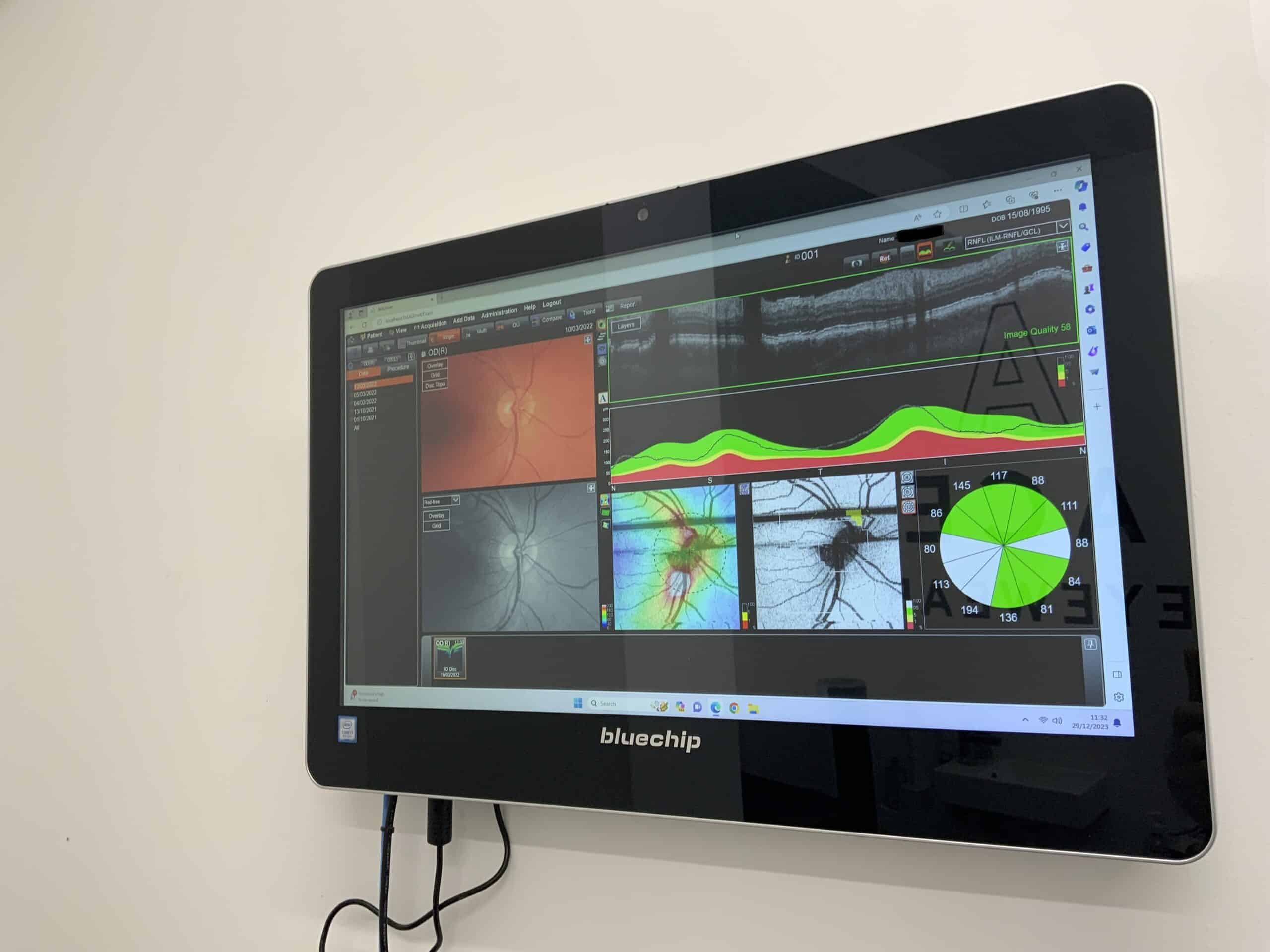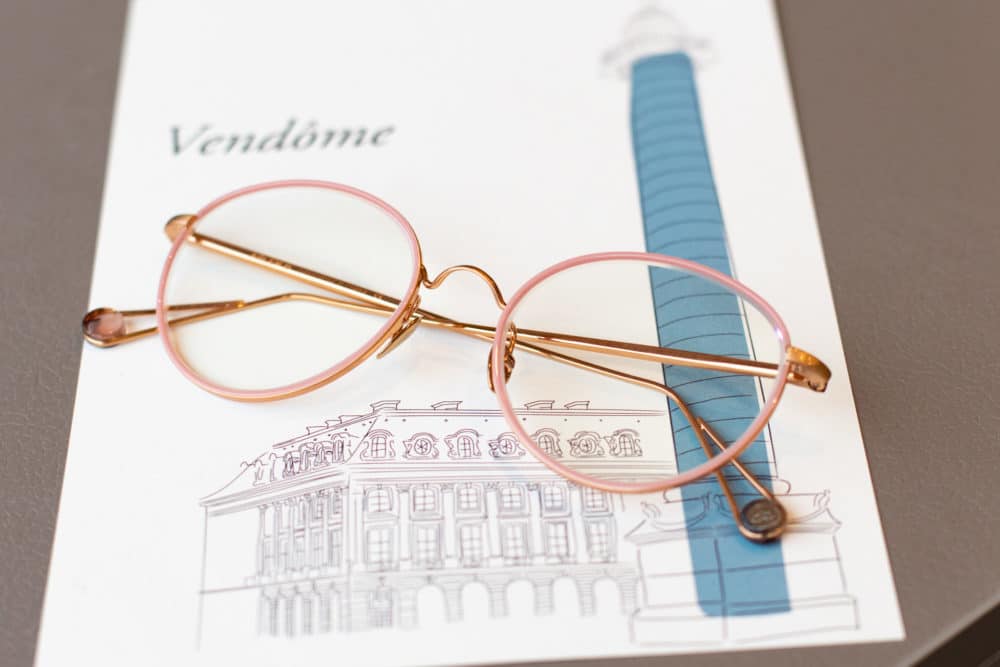29-12-23 By: Michael Stent
How long does an eye test take?
How long does an adult eye test take?
A typical eye test at a high street optician will typically last only 15-25 minutes. However, this is just an approximation as each patient is different, some patients may not require a prescription, whereas some will be more complicated and take longer. This may be because they have a number of ongoing ocular conditions, a very high prescription or can be due to age.
How long does an eye test take? Ace Eyewear’s Enhanced Eye Test
Here at Ace Eyewear, we pride ourselves on offering the most thorough, comprehensive and in-depth eye examinations available. With even our standard eye examination lasts an hour in length and our enhanced examination lasts an hour and a quarter.
All of the tests performed during your eye test including pressure checks, visual fields and OCT scans are performed and analysed by our GOC registered optometrists.
This time not only allows us to ensure nothing about your eye examination is rushed. While also leaving time for you to discuss your visual needs, any areas of vision you may be struggling with and concerns you might have with your vision and overall eye health.

What can an eye test detect?
Refractive Errors
-
- Myopia or Short-sightedness – someone who is short-sighted will struggle to see objects in the distance.
- Hyperopia or Long-sightedness – people who are mildly long-sighted can see objects in the distance but struggle focusing on near objects. However, as the level of hyperopia increases the clarity of a patient’s distance vision will decrease.
- Astigmatism – often described by opticians as the shape of your eye being a rugby ball shape rather than round like a football. Correcting a person’s astigmatism will help them see fine details much easier.
- Presbyopia – this is when the crystalline lens in your eye is no longer flexible enough to help you focus on near objects. This is a natural occurrence that happens as we age and is noticed around the age of 45. Tell tell signs that you are hitting presbyopia is when you start holding books or your phone further away from you so that you can read it.
Amblyopia or Lazy Eye
-
- This a condition where the level of vision out of one eye is significantly reduced compared with the other. This is often caused by having a squint as a child.
Strabismus
-
- This is caused by a weakness in one of the muscles in your eye. This causes your eye to turn up, down, left or right depending on which muscle has the weakness.
Common Eye Conditions
-
- Glaucoma: Increased pressure within the eye damaging the optic nerve.
- Cataracts: Clouding of the eye’s crystalline lens, this normally happens naturally over time however it can move at a quicker pace due to excessive UV exposure.
- Macular Degeneration: Breakdown or damage to the macula, which is the part of your eye responsible for your central vision.
Dry Eyes
-
- Insufficient tears or poor tear quality, leading to dryness, irritation, and discomfort.
Corneal Abnormalities
-
- Keratoconus: Thinning and bulging of the cornea.
- Corneal Abrasions: Scratches on the corneal surface, these occur accidentally you could accidentally scratch your cornea with your nail or by an abrasive particle flying into your eye such as grit etc. These are common injuries for gardeners, builders or sculptures who don’t wear eye protection.
Systemic Health Conditions
-
- Hypertension or High Blood Pressure
- Diabetes: Diabetic retinopathy can be detected through eye exams.
- Autoimmune disorders: Conditions affecting the eyes, such as rheumatoid arthritis.
Colour Vision Deficiency
-
- Inability to perceive certain colours accurately. People with colour deficiencies confuse red and green along with blue and yellow.
Ocular Tumours
-
- Rare, but eye tests can sometimes identify forms of tumours.
Infections
-
- Eye tests can detect various eye infections, such as bacterial or viral conjunctivitis.
Retinal Detachment
-
- Separation of the retina from the underlying tissue, which requires immediate attention.
How often should you have an eye test?
This varies depending on a multiple number of factors including, age, family history and if you have any eye conditions such as glaucoma or cataracts.
However, the College of Optometrists recommends that children under sixteen and adults over 70 have an eye test every year and that people between 17 – 69 have an eye test every two years.
If you do experience any problems with your vision or eyes in between appointments don’t be afraid to contact us.
What do I need to bring to an eye test?
- A copy of your latest prescription from your previous optometrist
- All glasses that you wear whether this be your reading glasses, varifocals or sunglasses. Before your eye test we will measure the prescription of all of your glasses this allows us to determine if your prescription has changed and we can therefore advise you if you should update your glasses or not.
- List of any medications that you take
- If you have ever visited the hospital for your eyes we recommend bringing a copy of your referral letter and consultants letter.
- If you are also booked in for a contact lens check then please come to the appointment wearing your contact lenses. Please put them in two hours before your appointment and if you are a new patient to us please bring a copy of your contact lens prescription or specifications.

After your eye test
After your eye test has been completed you will be handed over to one of our dispensing opticians who will discuss with you the various lens options available for your prescription.
Along with what lens type they recommend and the advantages and disadvantages (if there are any) of each option so that you can make an educated decision on the best vision correction for you.
We know that choosing glasses can be tricky with so many shapes, styles and colours stocked at our store. They will analyse your face shape and recommend a number of frame styles for you to try that will compliment your face shape, features, complexion and of course your personal style.
Book your eye test
Ready to book your eye test? You can simply book online below or if you wish to ask any questions prior to your eye examination simply give us a call and we will be happy to answer them.




